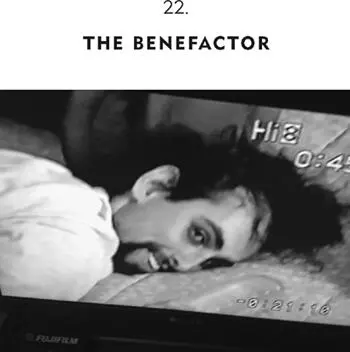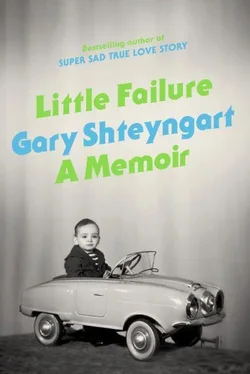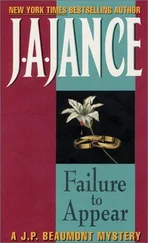I write a story called “Three Views from the Avenue of Karl Marx,” an earnest homage to my uncle Aaron and the labor camps. My professor tells me to send it off to The New Yorker , nearly precipitating a happy heart attack on my part. Am I really that good? My mother reads it, sighs, and tells me, “That’s not how it happened.” The details are all wrong.
I am heartbroken. Oddly enough, the pain feels similar to being called a Red Gerbil in Hebrew school. There, I was ridiculed for being an inauthentic American, and now I am being charged with being an inauthentic Russian. I do not yet understand that this very paradox is the true subject of so-called immigrant fiction. When the inevitable rejection slip comes from The New Yorker , I decide I have to go back to Russia to get the details right.
But then there is the other woman.
J.Z. understands that I need Russia for my stories. But she doesn’t want to lose me for a year. We are just getting started. We are so very much in love. And so I have a choice: my writing or, possibly, my girlfriend.
It is not even a choice.
Fuck Russia. I will spend a semester with J.Z. in then-trendy Prague.
Within minutes the brick and mortar appeared on both sides of the road, like a signpost signaling VLADIMIR’S CHILDHOOD, NEXT HUNDRED EXITS: an endless stretch of rickety plaster Soviet-era apartment houses, each edifice peeling and waterlogged so that the inadvertent shapes of animals and constellations could be recognized by an imaginative child. And in the spaces between these behemoths were the tiny grazing spaces where Vladimir sometimes played; spaces adorned with a fistful of sand and some rusty swings. True, this was Prava and not Leningrad, but then these houses formed one long demented line from Tajikistan to Berlin. There was no stopping them.
These sentences appeared in my first novel, The Russian Debutante’s Handbook . Needless to say, Prava is a kind of Prague, and Vladimir, the hero, is a kind of me. When I saw those Soviet bloc apartment buildings, paneláks in Czech (literally “prefabricated panel housing”), out of the window of a bus from Prague’s airport, J.Z.’s hand clasped in mine, I knew I wanted to write a novel, and I knew what it would be about. When you’re twenty-one there really is only one subject. It appears in the mirror each morning, toothbrush in hand.
The semester in Prague was my reconnaissance mission. In practical terms, I learned nothing, not even Czech, which should have been fairly easy for a Russian speaker. Maybe I learned that a half draft of pilsner spilled over a plate of onions and cheese and then sopped up with thick country bread could make me happy.
Along the way, some things happened that happened also in my novel. In a small village north of Prague, I was nearly beaten to a pulp by Czech skinheads who mistook me for an Arab. I was saved by my New York State driver’s license and my American Express card, proof of my non-Arabian nature. (In the novel, my hero, Vladimir, gets the beating from which I escaped, and then some.)
Then there were some things that happened nearly as they did in my novel. Jealous after J.Z. had danced with an Australian or an Israeli, I drank myself so stupid that I found myself crawling along the tram lines to our dormitory, my death forestalled only by the ferocious nighttime clang of the number 22 tram and the intervention of an equally drunk Czech policeman.
And then there were some things that didn’t happen in the novel at all. On Buda Hill, overlooking the bulbous and overdone Hungarian parliament building, J.Z. stared into my camera lens, her black hair picked up by the wind, the combination of Armenian and southern Wasp features finally settling into something undeniably Eastern European, the smile that wasn’t, the pale beauty that was.

A cold, rainy, muddy, miserable day in late May. The Oberlin College commencement exercises of 1995. Two-thirds of the manuscript of what will be my first novel is under my arm. I am happy and I am scared. J.Z. and I are breaking up. It is not anyone’s fault. She wants to return to North Carolina. I want to be in New York, where I mistakenly think another love will quickly swoon into my arms.
But I don’t want to end my Oberlin story there. Let me go back a year. There is a dorm called South, which, as I’ve mentioned, resembles a lost terminal of Newark Airport. This is where I’ve just had an asthma attack, my first in five years and the worst one of my life.
It’s been several weeks since I’ve checked out of Oberlin’s pitiful hospital, several weeks since J.Z. held the phone clamped to her ear, my mother relaying to her my health insurance information as I struggled to breathe in my sweaty little dorm bed; the two women in my life, their Russian and southern accents, my mother’s awful exactness, J.Z.’s love and fear.
She has nursed me back to health, has spent every hour by my side. The circles under my eyes are larger than usual. Because of the asthma I haven’t been able to smoke pot in weeks, and I’m nervous and depleted. One of the many things I never learned how to do is dance. But tonight J.Z. says she will teach me. She puts on Terence Trent D’Arby’s “Sign Your Name (Across My Heart),” the 1988 slow jam that has somehow survived the full Kurt Cobaining of Oberlin’s stereos. She puts her hands on my hips, and I put mine on hers. I let my eyes fall shut. Slow, rhythmic breathing. The ugly dorm, the sad college, the unhappy students. I sway in one direction; I sway in another. What am I doing wrong? I don’t want to have another asthma attack. My hands are resting on my lover’s hips, and part of me, perhaps because of the recent asthma, has left my body. What I don’t yet know is that this will be my last asthma attack ever. But for now the two of us are still here, swaying to Trent D’Arby’s earnest crooning.
“J.Z.,” I say, “I don’t know how to do this.”
She keeps her hands on my hips. Her dark hair with its brown highlights pools across my chest.
And then, suddenly, I do.

The author is tripping out of his mind on psychedelic mushrooms while being videotaped for a documentary called Only Children by his new friend John.
ON THE NINE-HOUR DRIVE HOME from Ohio, my diploma in hand, my parents and I stop in for a McDonald’s lunch. Remarkably, the hamburgers haven’t changed in price over the years, so I order three, plus a medium Coke and medium fries, and my parents also go in for a hamburger each and share some of my medium fries as well as their own private small Coke. Because of my fine grades and impending job as a paralegal, and then, presumably, ascension to law school, all of us are a happy family and five times sixty-nine cents for the hamburgers plus another three dollars and fifty cents for the hamburger accessories seems well within reach. We’ve earned this now. Across the aisle I espy one of the prettier Oberlin graduates, a girl who uses lipstick, and we both roll our eyes at one another, as if to say, Ugh, can you believe we’re at a McDonald’s? If only I could tell her how much each bite with my parents really means to me.
The other thing I’m excited about is going back to New York, the place I know will be my home for the rest of my life. With J.Z. no longer my girlfriend, going home means mainly one thing: going back to my new best friend.
Allow me to backtrack to sophomore year.
Читать дальше














